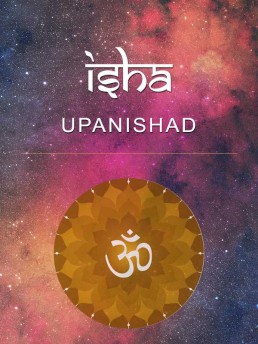एवं त्वयि नान्यथेतोऽस्ति न कर्म लिप्यते नरे ॥ २ ॥
evaṃ tvayi nānyatheto’sti na karma lipyate nare || 2 ||
Isha Upanishad Home
Isha – Sri Shankara’s Introduction
Isha – Invocation
Isha – 1-īśāvāsyamidaṃ sarvaṃ
Isha – 2-kurvanneveha karmāṇi
Isha – 3-asuryā nāma te lokā
Isha – 4-anejadekaṃ manaso
Isha – 5-tadejati tannaijati
Isha – 6-yastu sarvāṇi
Isha – 7-yasminsarvāṇi bhūtāny
Isha – 8-sa paryagāc chukram
Isha – 9-andhantamaḥ praviśanti
Isha – 10-anyad evāhur vidyayā
Isha – 11-vidyāṁ cāvidyāṁ ca
Isha – 12-andhaṁ tamaḥ praviśanti
Isha – 13-anyad evahūḥ
Isha – 14-sambhūtiṁ ca vināśaṁ
Isha – 15-hiraṇmayena pātreṇa
Isha – 16-pūṣann ekarṣe yama
Isha – 17-vāyur anilam amṛtam
Isha – 18-agne naya supathā

Commentary by Sri Adi Sankaracharya – Translated in English
Thus the drift of the Vedic text is that he who knows the Atman should renounce the three-fold desire of son, etc., and save his Atman by being centred in the knowledge of the Atman (Gnananishtha). The mantras now proceed to inculcate the following for the benefit of him who does not know the Atman and is not competent to cognize the Atman as above indicated.
Kurvanneva means certainly doing, i.e., ‘only by doing.’ Karmani means ‘Agnihotara, etc.’ Jijivishet means ‘should like to live.’ Satamsamah means ‘a hundred years.’ It has been declared that that is a man’s longest life. Thus declaring agreeably to natural inclination the desire to live a hundred years, the text lays down the injunction in respect of how one should livecontinually performing Karma and not otherwise. If you would thus live, content to be a man, there is no other mode of life than the one of performing Agnihotra, etc., by which bad Karma may not cling to you. Therefore, one should like to live doing Karma enjoined by the Sastras such as Agnihotra, etc. But how is this drift arrived at? By the previous mantra, Gnananishtha has been inculcated to the sanyasin. By this. Karmanistha is enjoined on those who are not able to become sanyasins. Do you not remember it was pointed out that the antithesis between Knowledge and Karma is a fact unshakable like a mountain? Here also it has been said that be who would like to live must perform Karma and that this universe must be abandoned as unreal, in the contemplation of the Lord as all, by one who would protect his Atman having renounced all and not coveting anybody’s wealth. According to the Srutis it is settled that one should not long for either life or death and should leave for the forest. There is also the injunction by which one is interdicted from returning thencethus ordaining sanyasa.
The distinction in the results of the two courses will also be pointed out. (The Narayana Upanishad) says
“In the beginning these two roads were laid. The road through Karma and sanyasa; the latter consists in the renunciation of the threefold desire. Of these, the road through sanyasa is the preferable one.”
The Taittiriya Upanishad also says, “Renunciation (Nyasa) certainly is to be preferred.”
Bhagavan Vyasa, the preceptor of the Vedas, after much discussion told his son his firm conviction in the following text.
“These then are the two roads on which the Vedas are based. Both the coursesone which leads to Karma and the other which draws away from Karma have been explained, etc.” This division will be explained.
Commentary by Swami Sivananda
The first Mantra lays down the rule for Knowledge. This Mantra lays down the rule for works. This gives advice to those who cannot get themselves liberated from the bonds of the world. Karmanishtha is prescribed here for those who are unable to take up Sannyasa. Kurvanneva means certainly doing, only by doing and not refraining from them. Eva gives definite force. Karmani means works enjoined by the Vedas such as Agnihotra and other rites. The omission of these works causes sin.
Jijivishet means ‘should wish to live’. Satam samah means ‘a hundred years’. This is the longest period of life for a man in Kaliyuga. One should wish to live for one hundred years continually doing Karma and not otherwise. Leading an idle, easy-going life will not do. He should do the religious rites daily and also he should do constant selfless, disinterested service to the humanity with Atman-Bhava. Then only he will get purification of heart (Chitta-suddhi). Then only Atma-Jnana will dawn in his heart. By such performance of works without any motive, one will not be bound to works. This is the path of action or Pravritti Marga.
Ishavasya Upanishad – Verse 2 – Isha – 2-kurvanneveha karmāṇi – In Sanskrit with English Transliteration, Meaning and Commentary by Adi Shankaracharya (Sankara Bhashya) and Swami Sivananda – Ishavasya-2
